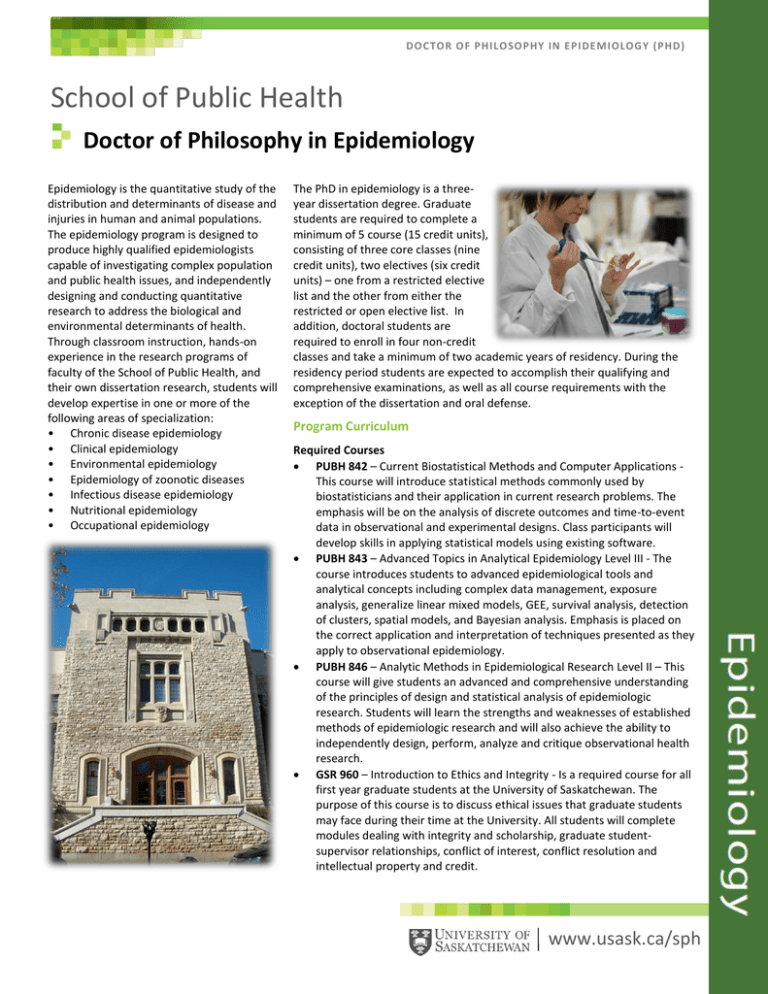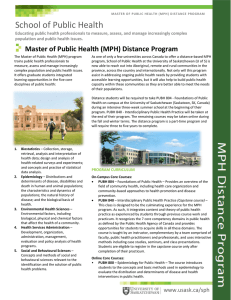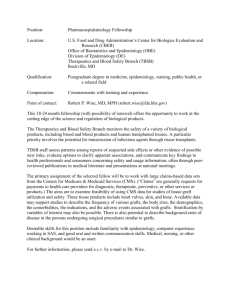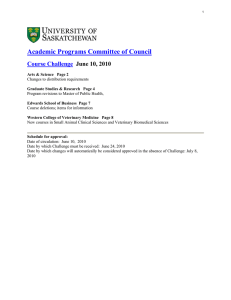School of Public Health Doctor of Philosophy in Epidemiology
advertisement

DOCTOR OF PHILOSOPHY IN EPIDEMIOLOGY (PHD) School of Public Health Doctor of Philosophy in Epidemiology Epidemiology is the quantitative study of the distribution and determinants of disease and injuries in human and animal populations. The epidemiology program is designed to produce highly qualified epidemiologists capable of investigating complex population and public health issues, and independently designing and conducting quantitative research to address the biological and environmental determinants of health. Through classroom instruction, hands-on experience in the research programs of faculty of the School of Public Health, and their own dissertation research, students will develop expertise in one or more of the following areas of specialization: • Chronic disease epidemiology • Clinical epidemiology • Environmental epidemiology • Epidemiology of zoonotic diseases • Infectious disease epidemiology • Nutritional epidemiology • Occupational epidemiology The PhD in epidemiology is a threeyear dissertation degree. Graduate students are required to complete a minimum of 5 course (15 credit units), consisting of three core classes (nine credit units), two electives (six credit units) – one from a restricted elective list and the other from either the restricted or open elective list. In addition, doctoral students are required to enroll in four non-credit classes and take a minimum of two academic years of residency. During the residency period students are expected to accomplish their qualifying and comprehensive examinations, as well as all course requirements with the exception of the dissertation and oral defense. Program Curriculum Required Courses PUBH 842 – Current Biostatistical Methods and Computer Applications This course will introduce statistical methods commonly used by biostatisticians and their application in current research problems. The emphasis will be on the analysis of discrete outcomes and time-to-event data in observational and experimental designs. Class participants will develop skills in applying statistical models using existing software. PUBH 843 – Advanced Topics in Analytical Epidemiology Level III - The course introduces students to advanced epidemiological tools and analytical concepts including complex data management, exposure analysis, generalize linear mixed models, GEE, survival analysis, detection of clusters, spatial models, and Bayesian analysis. Emphasis is placed on the correct application and interpretation of techniques presented as they apply to observational epidemiology. PUBH 846 – Analytic Methods in Epidemiological Research Level II – This course will give students an advanced and comprehensive understanding of the principles of design and statistical analysis of epidemiologic research. Students will learn the strengths and weaknesses of established methods of epidemiologic research and will also achieve the ability to independently design, perform, analyze and critique observational health research. GSR 960 – Introduction to Ethics and Integrity - Is a required course for all first year graduate students at the University of Saskatchewan. The purpose of this course is to discuss ethical issues that graduate students may face during their time at the University. All students will complete modules dealing with integrity and scholarship, graduate studentsupervisor relationships, conflict of interest, conflict resolution and intellectual property and credit. www.usask.ca/sph GSR 961 – Ethics and Integrity in Human Research – Introduces students to the ethics of research with human subjects. Students will complete the Tri-Council Policy Statement: Ethics Conduct for Research involving Humans (TCPS) Tutorial and become familiar with the human ethics processes at the University of Saskatchewan. Required Courses – All PhD students must maintain continuous registration in the following two courses PUBH 990 – Public Health Seminar – PhD students must maintain continuous registration in the fall and winter Public Health Seminar Class (PUBH 990). This seminar series will cover a variety of important and timely topics potentially including: food safety (e.g. Listeriosis), water and health, influenza, SARS, prion diseases (BSE/nvCJD/CWD); diabetes, cancer, HIV, hepatitis, community mental health issues, zoonotic diseases, hospital acquired infections, risk assessment, risk communication, knowledge translation, confidentiality and data management in health surveillance, screening programs, global health issues, human resources in public health, immigrant and refugee health, Aboriginal health issues, rural health issues, urban health issues, agricultural health and safety issues, and social determinants of health. Students will be expected to attend 75% of the seminars during their first two years of the PhD degree. Each student will be expected to present one research seminar during both the first and second year of their program of studies as part of the requirements for PUBH 990. PUBH 996 – PhD Research – Students enrolled in the PhD Program in Epidemiology who are writing a thesis must register and maintain continuous registration in this course. Restricted Elective Courses All students must select at least one of the following restricted elective courses. These electives are chosen in consultation with the student’s faculty supervisor. In planning their schedule, students should remember that not all courses are offered in any given year. AGMD 801 – Introduction to Occupational and Environmental Health CHEP 802 – Community and Population Health Research Methods CHEP 806 – Applied Statistical Methods for Follow-up Data CHEP 810 – Advanced Topics in Clinical Trials CMPT 838 – Simulation for Health Policy Modeling NURS 892 – Research Methods NURS 894 – Systematic Reviews of Healthcare Interventions NURS 897 – Nursing Research: Advanced Research Methods in Quantitative Design PUBH 809 – Field Epidemiology PUBH 832 – Infectious Disease Epidemiology PUBH 844 – Chronic Disease Epidemiology PUBH 845 – Clinical Epidemiology VLAC 840 – Zoonoses and Food Safety VLAC 881 – Clinical Trial Design and Analysis For additional open elective courses, please visit www.usask.ca/sph. Application Qualifications All candidates interested in the Epidemiology PhD will need to meet the University of Saskatchewan's graduate studies requirements. Applicants to the program are required to have an undergraduate degree in a life, behavioral or social sciences and an MSc in the life, behavioral or social sciences, MN, MVetSc, MBA, or MPH, with a 75% average or greater in their last two years of study. Applicants are also expected to have completed PUBH 800 (Epidemiology for Public Health) and PUBH 805 (Biostatistics for Public Health) or their equivalents with a minimum average of 75% in each course prior to application to this program. Candidates must also demonstrate previous research experience. Those who have previously not completed a thesis-based program and have limited research experience may be admitted on a probationary basis until they have completed a research work experience under the direction of an appropriate supervisor. This research experience must be completed during their first two years of study and would include a minimum of 120 hours applied to a research project not directly related to their dissertation. Applicants undertaking this option will be expected to present their findings at the completion of their project. For more information on admission requirements, please visit www.usask.ca/sph. MORE INFORMATION For more information regarding our program, courses, prerequisites, and tuition fees, please visit: Website: www.usask.ca/sph Email: sph.admissions@usask.ca





